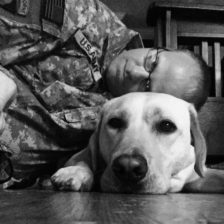I recently read an essay penned by a spouse whose husband has PTSD. She wrote about visiting her psychologist and she heard the words “spouse secondary PTSD” for the first time.
Now don’t get me wrong, I understand very well that secondary PTSD can occur…but have you ever really thought about what that is, and how it can affect someone you love?
A number of studies have shown that Veterans PTSD symptoms can negatively affect the family. As some of you may (or may not) know, Sam’s PTSD was something he masked and tried to cover up for a very long time. We saw PTSD and how hard it is for Sam at times when we were on a family vacation with another military couple and their children. I questioned everything about our relationship, how could he just shut down, walk away, want to give up, and leave us?
That vacation and that moment made me realize Sam needed more help than I could give, and at the time, he needed more help that he was receiving from the VA.
That’s when he applied for This Able Veteran.
In a study by Nelson and Wright, they discovered that partners of PTSD-diagnosed Veterans often describe difficulty coping with their partner’s PTSD symptoms, describe stress because their needs are unmet, and sometimes describe physical and emotional violence.
I can honestly say that at times there are difficult moments, and there is stress, but there’s absolutely no violence in our home.
However, I know that is not the case for everyone, like the essay I read of a spouse who recently came to terms with the fact she suffers secondary PTSD.
Being the wife and caregiver of a Veteran who suffers from PTSD, TBI, and many other injuries from war is not easy. Terms like “caregiver burden” come up, and it seriously makes me cringe. Sam is not a burden to me, or to our children. He never will be. I read stories of wives who just can’t live another day in their home with their Veteran because it is too much. I read about family situations where there’s a Veteran who cannot work, cannot help with the children, and the stress is put on the spouse or partner.
Friends, I am here to tell you that it is not easy, but you can make it work, and you can make the best of a variety of situations. Sam and I try to share household tasks. Is it a lot of work? Yes. Does Sam need a reminder sometimes about food being left out, cabinets being left open, trash needs to go out, or laundry…yes. Does he cook dinner, help with homework, go grocery shopping, do laundry, and mp…you bet.
House upkeep is not easy, and I will be the first to tell you, Sam has really helped out a ton since we’ve had one kid down with the flu. He even let me sleep in after being up and down all night with the sick one…that meant so much.
Work can be emotionally draining for Sam. After long days this week, I know he has been exhausted. He’s helped out so much with the kids, the housework, the cooking, that I feel like I don’t deserve someone so good and kind. I’m blessed.
We try to work through those moments of doubt when PTSD starts to creep in when anxiety gets high. We’ve had a few moments this week that we just have to talk out, pray about, and sort through…and it is worth it. It is SO worth it.
Life is tough, but so are we.
We try not to stress over the things we cannot control.
We try to laugh more than we cry. Laughter is sometimes indeed the best medicine.
We love our time with family. We’ve felt quarantined this week because of the flu, but we’ve made it. (Seriously TGIF)
We work through PTSD. While there is such a thing as secondary PTSD, we try to strive to understand trauma and we try to talk through various moments, situations that might cause some stress and anxiety.
And, we go to therapy.

